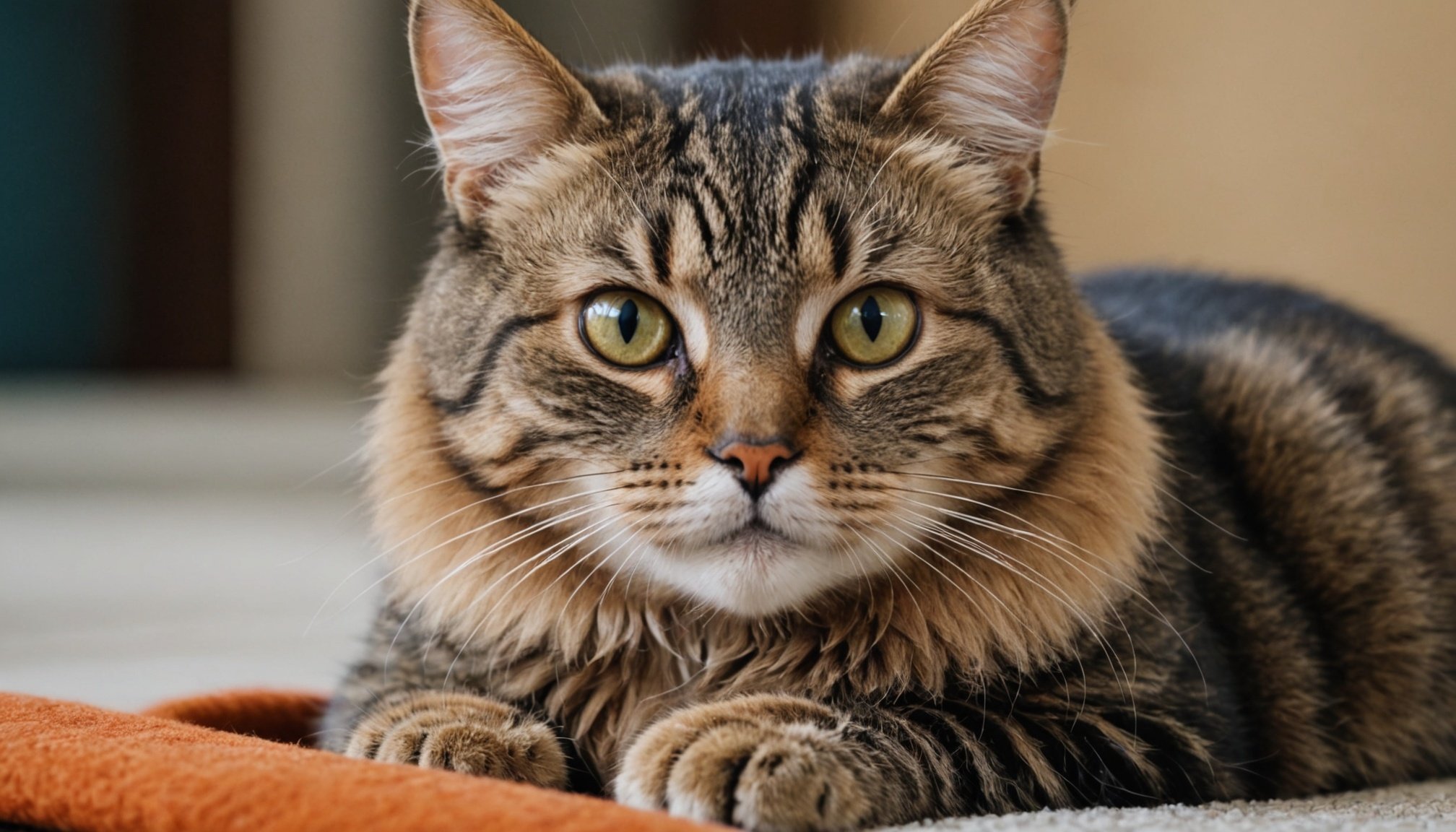Welcoming a cat with Feline Immunodeficiency Virus (FIV) into your home requires thoughtful preparation and understanding. FIV-positive cats can lead happy, fulfilling lives, but they need special care to ensure their health and well-being. You’ll discover essential considerations, from creating a safe environment to understanding their unique needs. This guide aims to empower you with the knowledge to provide a loving home for your new feline friend. Embrace the journey of caring for an FIV-positive cat and make a positive difference in their life.
Understanding Feline Immunodeficiency Virus (FIV)
Exploring the intricacies of Feline Immunodeficiency Virus (FIV) is crucial for any cat owner. This virus, similar to HIV in humans, compromises a cat's immune system, making them susceptible to various infections. FIV is primarily transmitted through bite wounds, emphasizing the importance of monitoring your feline's interactions, especially with stray or aggressive cats.
A découvrir également : Effective Strategies to Teach Your Cat to Recognize Its Name and Come When Called
Symptoms and Diagnosis
Recognizing the symptoms of FIV can be challenging, as they often mimic other illnesses. Common signs include weight loss, poor coat condition, and persistent fever. A veterinarian can diagnose FIV through blood tests designed to detect antibodies. Early detection is vital for managing a cat's health effectively.
Impact on the Immune System
The FIV virus targets a cat's immune system, gradually weakening its ability to fight off diseases. This can lead to secondary infections that are more severe and harder to treat. Despite this, many FIV-positive cats can live long, fulfilling lives with proper care and regular veterinary check-ups.
A découvrir également : Essential Tips for Safely Transporting Your Cat on a Long-Distance Road Trip: A Comprehensive Guide
Key Points to Remember:
- Transmission: Primarily through bites
- Symptoms: Weight loss, fever, poor coat
- Diagnosis: Blood test for antibodies
Understanding these aspects of FIV equips cat owners with the knowledge to make informed decisions about their pet's health and well-being.
Health Management for FIV-Positive Cats
Ensuring optimal care for your FIV-positive feline friend.
Regular Veterinary Check-Ups and Vaccinations
FIV-positive cats require consistent veterinary support to maintain their health. Regular check-ups are essential for monitoring any changes in their condition. Vaccinations should be kept up to date, as they help prevent secondary infections. A health management routine tailored to your cat's needs can significantly enhance their quality of life.
Importance of a Health Management Routine
Establishing a structured health management routine is crucial for FIV care. This includes a balanced diet, stress reduction, and a clean environment. Such measures can strengthen their immune system, enabling them to live longer, healthier lives. Consistent health monitoring will alert you to any new symptoms or changes.
Signs of Illness to Watch For
Being vigilant about your cat's health is key. Look out for signs such as lethargy, appetite loss, or changes in behavior. These could indicate an underlying issue requiring prompt veterinary support. Early intervention can prevent complications and ensure effective FIV care.
- Key Points:
- Regular check-ups and vaccinations
- Structured health management routine
- Vigilance for signs of illness
By focusing on these areas, you can provide comprehensive care for your FIV-positive cat.
Behavioral Considerations for FIV Cats
Understanding the nuances of feline psychology is crucial for FIV-positive cats.
Understanding Behavior Changes in FIV-Positive Cats
FIV-positive cats may exhibit notable behavior changes due to their compromised health and immune systems. These changes can include increased aggression or withdrawal, largely influenced by their interactions with other cats. Recognizing these shifts is essential for managing their well-being. A cat's behavior is a window into its health, making it vital to observe any deviations from the norm.
Tips for Socializing an FIV-Positive Cat
Socializing an FIV-positive cat requires patience and understanding. Introduce them to new environments and companions gradually to prevent stress. Use positive reinforcement to encourage interaction, and ensure their space is safe and comfortable. This approach not only aids in reducing anxiety but also fosters a sense of security.
- Key Tips for Socializing:
- Gradual introductions
- Positive reinforcement
- Safe and comfortable environments
Recognizing Stress and Anxiety in Cats
Stress and anxiety in FIV-positive cats can manifest as changes in appetite or grooming habits. It's crucial to create a calm environment and minimize exposure to stressors. Regular veterinary check-ups can help identify any underlying health issues contributing to anxiety.
Understanding these behavioral aspects ensures a supportive environment for your FIV-positive cat.
Creating a Safe Living Environment
Designing the ideal home for your FIV-positive feline friend.
Essential Elements for a Comfortable Cat Space
Creating a safe living environment is vital for an FIV cat. A cozy, quiet area with soft bedding ensures comfort and reduces stress. Include interactive toys to stimulate their mind and body, promoting well-being. A cat housing setup with vertical spaces, like shelves or cat trees, allows them to explore safely, fulfilling their natural instincts.
Preventing Exposure to Potential Health Risks
To minimize health risks, keep your FIV cat's environment clean and free from harmful substances. Regularly sanitize their litter box and feeding area. Avoid interactions with stray animals to prevent disease transmission. A home setup that includes secure windows and doors prevents escape and exposure to potential hazards.
Importance of a Quiet and Safe Area for the Cat
A quiet and safe area is crucial for an FIV cat's peace of mind. This space should be away from loud noises and household commotion. Ensure it has hiding spots where they can retreat when feeling anxious. Consistency in their home setup helps them feel secure, promoting a stable and happy life.
- Key Considerations:
- Soft bedding and interactive toys
- Clean environment
- Secure windows and doors
By focusing on these elements, you can create a nurturing space for your FIV cat.
Integrating FIV Cats with Other Pets
Ensuring a harmonious multi-pet household.
Steps for Introducing an FIV-Positive Cat to Other Pets
Introducing an FIV-positive cat to a multi-pet household requires careful planning to ensure a smooth transition. Start by keeping the new cat in a separate room, allowing other pets to become accustomed to its scent. Gradually introduce them through a barrier, like a baby gate, to monitor reactions without direct contact.
Key Steps:
- Separate initial spaces
- Scent swapping
- Controlled visual introductions
Behavioral Signs to Monitor During Introductions
Observing behavioral signs is crucial when integrating an FIV cat with other pets. Look for signs of stress or aggression, such as hissing or swatting. Positive indicators include curiosity and calm postures.
Monitor for:
- Aggression (hissing, swatting)
- Stress (retreating, hiding)
- Positive interactions (sniffing, relaxed body language)
Long-Term Management of a Multi-Pet Household with FIV
Managing a multi-pet household with an FIV-positive cat involves ongoing vigilance. Maintain separate feeding areas to prevent conflict. Regular veterinary check-ups for all pets are essential to monitor health and prevent transmission of any illnesses.
Long-Term Tips:
- Separate feeding stations
- Regular health checks
- Monitor interactions regularly
By following these steps, you can foster a peaceful environment for your FIV cat and other pets.
Nutrition for FIV-Positive Cats
Ensuring optimal health through tailored dietary practices.
Recommended Dietary Practices
For FIV-positive cats, a tailored FIV diet is essential. Prioritize high-quality, protein-rich foods to support their immune system. Opt for balanced meals that include essential vitamins and minerals. A consistent feeding schedule helps maintain their energy levels and overall health.
Importance of High-Quality, Balanced Nutrition
High-quality nutrition is crucial for FIV-positive cats. Select foods with a balance of proteins, fats, and carbohydrates. Avoid fillers and artificial additives, which can stress their system. A well-rounded FIV diet aids in maintaining a healthy weight and coat, enhancing their quality of life.
Supplements and Special Dietary Needs
Consider supplements to address specific nutritional gaps in an FIV-positive cat's diet. Omega-3 fatty acids support immune function, while probiotics aid digestion. Consult with a veterinarian to tailor supplements to your cat's unique needs.
Key Nutritional Considerations:
- High-quality protein sources
- Balanced vitamins and minerals
- Tailored supplements for immune support
Incorporating these elements ensures that FIV-positive cats receive the necessary nutrients to thrive, promoting a healthier, more fulfilling life.
Potential Medical Needs and Treatments
Understanding the medical landscape for FIV-positive cats.
Common Medical Issues Associated with FIV
Feline Immunodeficiency Virus (FIV) often leads to a range of common medical issues that require vigilant monitoring. Cats with FIV may be more prone to dental diseases, skin infections, and upper respiratory infections. These conditions necessitate proactive medical care to maintain feline health.
Possible Treatments and Medications
Treating FIV involves a combination of medications and therapies tailored to each cat's needs. Antibiotics are frequently used to combat secondary infections, while anti-inflammatory drugs can help manage pain and discomfort. Regular medical care and monitoring by a veterinarian ensure that any emerging health issues are promptly addressed.
- Key Treatments:
- Antibiotics for infections
- Anti-inflammatory medications
- Regular veterinary assessments
Importance of Proactive Health Care and Monitoring
Proactive health care is critical for managing FIV. Regular check-ups allow for early detection of potential health issues, enabling timely intervention. Monitoring your cat's behavior and physical condition helps in adjusting treatments as needed, ensuring optimal feline health.
By focusing on these aspects, cat owners can effectively manage the medical needs of their FIV-positive pets, promoting a healthier and more comfortable life.
Emotional Aspects of Adopting an FIV-Positive Cat
Exploring the emotional journey of welcoming an FIV-positive feline into your home.
Addressing Misconceptions about FIV-Positive Cats
Adopting an FIV-positive cat often comes with preconceived notions. Many believe these cats are constantly ill or have a drastically reduced lifespan. However, with proper care, they can lead fulfilling lives. It's crucial to dispel these myths, fostering a more inclusive mindset towards cat adoption. Understanding that FIV-positive cats can thrive with love and attention helps prospective owners make informed decisions.
Providing Emotional Support to Your New Pet
Emotional support is vital for any newly adopted pet, especially an FIV-positive cat. These cats may experience stress or anxiety due to their health status. Providing a stable, nurturing environment helps them adjust. Consistent routines and gentle interactions build trust, enhancing their well-being. Your role as an emotional anchor is pivotal in their adaptation process.
Building a Bond with an FIV-Positive Cat
Forming a strong bond with an FIV-positive cat involves patience and understanding. Engage in activities they enjoy, like gentle play or quiet companionship. Observing their behavior and responding to their needs strengthens your connection. Remember, the bond you create offers mutual emotional support, enriching both your lives.
Key Points:
- Dispel myths about FIV
- Provide emotional stability
- Foster trust through patience
Resources and Support for FIV Care
Exploring avenues for comprehensive FIV support and community engagement.
Organizations and Groups Dedicated to FIV Awareness
Numerous organizations focus on raising FIV awareness and providing essential resources. Groups like the Feline Immunodeficiency Virus Society offer educational materials and support networks. These organizations are pivotal in spreading knowledge about FIV-positive cats, helping owners navigate the complexities of cat care.
Online Resources for FIV-Positive Cat Care
The internet is a valuable tool for accessing FIV support. Websites and forums dedicated to FIV-positive cat care provide a wealth of information, from dietary tips to behavioral advice. Engaging with these platforms ensures you stay informed about the latest care practices, fostering a better understanding of your cat's needs.
Networking with Other FIV Cat Owners for Support
Connecting with fellow FIV cat owners can be incredibly beneficial. Sharing experiences and strategies creates a community of support, offering practical advice and emotional encouragement. Consider joining local meetups or online groups to exchange insights on cat care.
- Key Resources:
- Feline Immunodeficiency Virus Society
- Online forums and websites
- Local and online support groups
By leveraging these resources, you can enhance your FIV-positive cat's well-being and ensure comprehensive FIV support.






